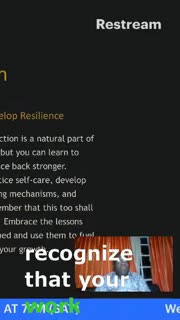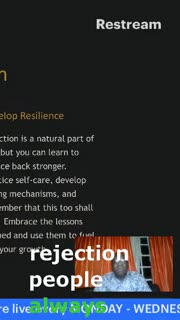Overcoming Rejection: Embracing Healing and Identity in Christ
Devotional
Sermon Summary
Bible Study Guide
Sermon Clips
### Quotes for Outreach
1. "Rejection is the act of not giving someone the love or the attention they need and expect. Another definition I have of rejection is an act of refusing to accept, use, or believe someone or something. So we have to understand that all of us have been through rejection one way or the other anyway." [16:04] (35 seconds)
2. "Rejection can trigger intense feelings of hurt, inadequacy, and isolation. It strikes at our core need for belonging and acceptance. You know, and that's a key thing here. That's what the devil gets us. Human beings are social beings. We are created to live in groups. We need to live among our peers, and living among our peers means there's a cry, there's a need for acceptance, there's a need for belonging." [26:06] (28 seconds)
3. "When we don't feel accepted, we don't feel like we belong to a particular group. What happens is it ejects us from the group and exposes us to anything else that can embrace us. And this is one of the things that gangsterism thrives on. This is one of the things that gangsterism prospers on because most of the people that get sucked up into gangsterism is because of this rejection thing where they feel rejected by their immediate social gathering, which is their family." [26:54] (29 seconds)
4. "Belonging and acceptance is very, very important. Every human being deserves that, at least in the family circle. Even if the family circle fails, thank God for Jesus that we have what we call church. Church is never just a building. Church is a people. It's a family." [28:05] (15 seconds)
5. "Rejection can open the door for dark spiritual forces. Demons, demonic entities, take advantage of rejection to gain a foothold in our lives. These entities seek to exploit our vulnerability and keep us trapped in a cycle of pain and isolation." [29:05] (21 seconds)
### Quotes for Members
1. "Many people that have been used, abused, controlled, oppressed by that spirit are people of rejection, people that have an issue with rejection. And from my personal experience, every single person I know that has been used by that spirit to control and oppress other people, they have been a tool in the hands of the enemy. They have this rejection problem at the root." [08:04] (23 seconds)
2. "When you experience rejection, demons, as a matter of fact, they enjoy people going through trauma. They love trauma. They love trauma in human beings because trauma destroys your soul. Not just destroys your soul, I mean, it wounds your soul. There's a word called soul fragmentation. Let's say the devil wants to use somebody. He allows the person to go through so many traumatic experiences. And what he's doing through those traumatic experiences is fragmenting your soul. It's like cutting your soul into pieces, scattering your soul into pieces." [25:16] (37 seconds)
3. "Rejection is a natural part of life that you can learn to bounce back stronger. Practice self-care. Take care of yourself. The thing about rejection people is they love pleasing others because that's their way of receiving love. And that's how actually a lot of people that have rejection problems have issues with finances. They can't keep money because they like pleasing people with their money to gain attention." [46:16] (27 seconds)
4. "Recognize that your worth is not defined by the opinion of others, not even the opinion of your father or your mother. Remember, David, his father didn't think he could become a king. He didn't see that value in him, but God saw it. So you must come to a place where you understand that your worth is not defined by the opinion of people, but is defined by the one that created you, the one that made you." [47:08] (24 seconds)
5. "Rejection people always highlight the bad in them because they think that's why they are not loved in the first place. That's why they are rejected. I used to feel I'm not good enough. That's why my parents never loved me until I found out the truth, but the damage had been done. And I always look for things that make me not good enough. Every time something doesn't work, I say, 'Oh, because I'm not good enough.' When you fail, 'Oh, I'm not good enough.' 'Oh, I won't make it. It's not for me.' And those are people that give up very quickly. They give up very easily." [49:46] (28 seconds)
Ask a question about this sermon
1. "Rejection is the act of not giving someone the love or the attention they need and expect. Another definition I have of rejection is an act of refusing to accept, use, or believe someone or something. So we have to understand that all of us have been through rejection one way or the other anyway." [16:04] (35 seconds)
2. "Rejection can trigger intense feelings of hurt, inadequacy, and isolation. It strikes at our core need for belonging and acceptance. You know, and that's a key thing here. That's what the devil gets us. Human beings are social beings. We are created to live in groups. We need to live among our peers, and living among our peers means there's a cry, there's a need for acceptance, there's a need for belonging." [26:06] (28 seconds)
3. "When we don't feel accepted, we don't feel like we belong to a particular group. What happens is it ejects us from the group and exposes us to anything else that can embrace us. And this is one of the things that gangsterism thrives on. This is one of the things that gangsterism prospers on because most of the people that get sucked up into gangsterism is because of this rejection thing where they feel rejected by their immediate social gathering, which is their family." [26:54] (29 seconds)
4. "Belonging and acceptance is very, very important. Every human being deserves that, at least in the family circle. Even if the family circle fails, thank God for Jesus that we have what we call church. Church is never just a building. Church is a people. It's a family." [28:05] (15 seconds)
5. "Rejection can open the door for dark spiritual forces. Demons, demonic entities, take advantage of rejection to gain a foothold in our lives. These entities seek to exploit our vulnerability and keep us trapped in a cycle of pain and isolation." [29:05] (21 seconds)
### Quotes for Members
1. "Many people that have been used, abused, controlled, oppressed by that spirit are people of rejection, people that have an issue with rejection. And from my personal experience, every single person I know that has been used by that spirit to control and oppress other people, they have been a tool in the hands of the enemy. They have this rejection problem at the root." [08:04] (23 seconds)
2. "When you experience rejection, demons, as a matter of fact, they enjoy people going through trauma. They love trauma. They love trauma in human beings because trauma destroys your soul. Not just destroys your soul, I mean, it wounds your soul. There's a word called soul fragmentation. Let's say the devil wants to use somebody. He allows the person to go through so many traumatic experiences. And what he's doing through those traumatic experiences is fragmenting your soul. It's like cutting your soul into pieces, scattering your soul into pieces." [25:16] (37 seconds)
3. "Rejection is a natural part of life that you can learn to bounce back stronger. Practice self-care. Take care of yourself. The thing about rejection people is they love pleasing others because that's their way of receiving love. And that's how actually a lot of people that have rejection problems have issues with finances. They can't keep money because they like pleasing people with their money to gain attention." [46:16] (27 seconds)
4. "Recognize that your worth is not defined by the opinion of others, not even the opinion of your father or your mother. Remember, David, his father didn't think he could become a king. He didn't see that value in him, but God saw it. So you must come to a place where you understand that your worth is not defined by the opinion of people, but is defined by the one that created you, the one that made you." [47:08] (24 seconds)
5. "Rejection people always highlight the bad in them because they think that's why they are not loved in the first place. That's why they are rejected. I used to feel I'm not good enough. That's why my parents never loved me until I found out the truth, but the damage had been done. And I always look for things that make me not good enough. Every time something doesn't work, I say, 'Oh, because I'm not good enough.' When you fail, 'Oh, I'm not good enough.' 'Oh, I won't make it. It's not for me.' And those are people that give up very quickly. They give up very easily." [49:46] (28 seconds)










